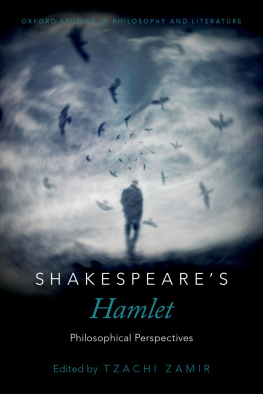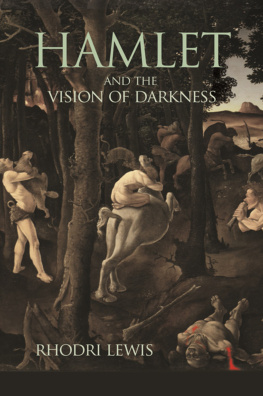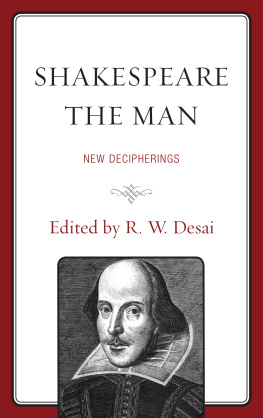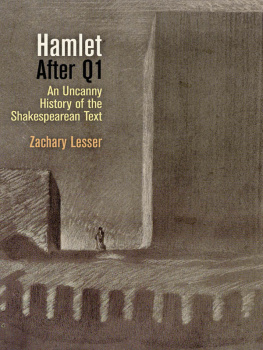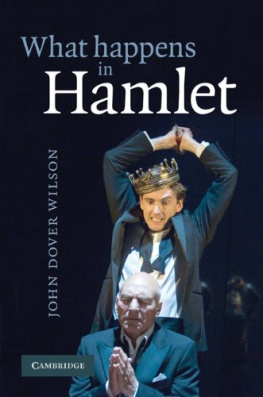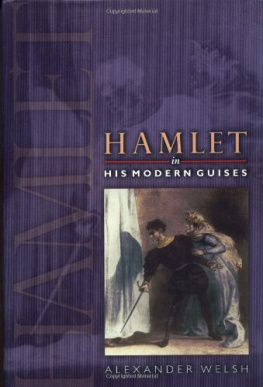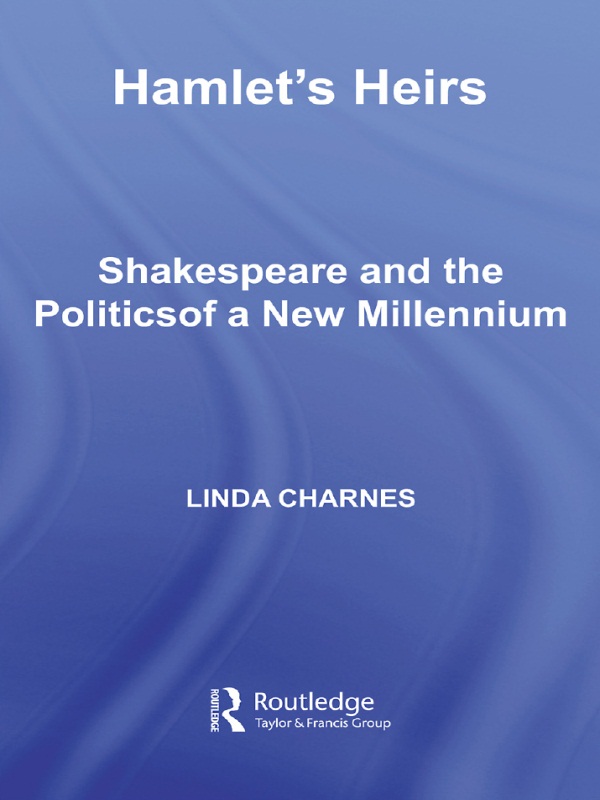Hamlets Heirs
Namesake princes and presidents; stolen thrones and elections; plutocrats and insurgents; campaign trails and war-mongering; waning monarchy and imperilled democracy; and revengers, early modern and postmodern these themes drive this provocative study of Shakespeares legacy in contemporary American and British politics.
Linked by focused readings of Hamlet and the Henriad, the essays follow Shakespeares two most famous royal sons, the princes Hamlet and Hal, as they haunt contemporary political psychology in the early years of a new millennium, and especially in the aftermath of September 11, 2001. Between devolution in Britain and the new doctrine of pre-emptive strike in the United States, our contemporary Hamlets and Hals epitomize a debate as fraught now as in Shakespeares day about the cost of spin-doctoring legacies. In exploring how current political culture inherits Shakespeare, Hamlets Heirs challenges scholarly assumptions about historical periodicity, modernity, and the uses of Shakespeare in present-day contexts.
Speaking to readers in a voice that is adventurous rather than authoritative, innovative rather than institutional, and speculative rather than orthodox, Charnes reveals that when it comes to legacy we are all, in one way or another, Hamlets heirs.
ACCENTS ON SHAKESPEARE
General Editor: TERENCE HAWKES
It is more than twenty years since the New Accents series helped to establish theory as a fundamental and continuing feature of the study of literature at the undergraduate level. Since then, the need for short, powerful cutting edge accounts of and comments on new developments has increased sharply. In the case of Shakespeare, books with this sort of focus have not been readily available. Accents on Shakespeare aims to supply them.
Accents on Shakespeare volumes will either apply theory, or broaden and adapt it in order to connect with concrete teaching concerns. In the process, they will also reflect and engage with the major developments in Shakespeare studies of the last ten years.
The series will lead as well as follow. In pursuit of this goal it will be a two-tiered series. In addition to affordable, adoptable titles aimed at modular undergraduate courses, it will include a number of research-based books. Spirited and committed, these second-tier volumes advocate radical change rather than stolidly reinforcing the status quo.
IN THE SAME SERIES
Shakespeare and Appropriation
Edited by Christy Desmet and Robert Sawyer
Shakespeare Without Women
Dympna Callaghan
Philosophical Shakespeares
Edited by John J. Joughin
Shakespeare and Modernity: Early Modern to Millennium
Edited by Hugh Grady
Marxist Shakespeares
Edited by Jean E. Howard and Scott Cutler Shershow
Shakespeare in Psychoanalysis
Philip Armstrong
Shakespeare and Modern Theatre: The Performance of Modernity
Edited by Michael Bristol and Kathleen McLuskie
Shakespeare and Feminist Performance: Ideology on Stage
Sarah Werner
Shame in Shakespeare
Ewan Fernie
The Sound of Shakespeare
Wes Folkerth
Shakespeare in the Present
Terence Hawkes
Making Shakespeare
Tiffany Stern
Spiritual Shakespeares
Ed. Ewan Fernie
Presentist Shakespeare
Ed. Terence Hawkes and Hugh Grady
Green Shakespeare: From Ecopolitics to Ecocriticism
Gabriel Egan
Hamlets Heirs: Shakespeare and thePolitics of a New Millennium
Linda Charnes
First published 2006 in the USA and Canada
by Routledge
270 Madison Ave, New York, NY 10016
Simultaneously published in the UK
by Routledge
2 Park Square, Milton Park, Abingdon, Oxon, OX14 4RN
This edition published in the Taylor & Francis e-Library, 2006.
To purchase your own copy of this or any of Taylor & Francis or Routledges collection of thousands of eBooks please go to www.eBookstore.tandf.co.uk.
Routledge is an imprint of the Taylor & Francis Group
2006 Linda Charnes
All rights reserved. No part of this book may be reprinted or reproduced or utilised in any form or by any electronic, mechanical, or other means, now known or hereafter invented, including photocopying and recording, or in any information storage or retrieval system, without permission in writing from the publishers.
British Library Cataloguing in Publication Data
A catalogue record for this book is available from the British Library
Library of Congress Cataloging in Publication Data
Charnes, Linda.
Hamlets heirs : Shakespeare & the politics of a new millennium / Linda Charnes.
p. cm. (Accents on Shakespeare)
Includes bibliographical references and index.
ISBN 0-415-26193-7 (alk. paper) ISBN 0-415-26194-5 (pbk. : alk. paper)
1. Shakespeare, William, 15641616. Hamlet. 2. Shakespeare, William, 15641616Political and social views. 3. Political plays, EnglishHistory and criticism. 4. Shakespeare, William, 15641616Influence. 5. Politics and literatureGreat Britain. 6. Inheritance and succession in literature. 7. Hamlet (Legendary character) 8. Monarchy in literature. 9. Princes in literature. I. Title. II. Series.
PR2807.C2776 2006
822.33dc22 2005030913
ISBN10: 0-415-26193-7ISBN13: 978-0-415-26193-7 (hbk)
ISBN10: 0-415-26194-5ISBN13: 978-0-415-26194-4 (pbk)
For Amanda and Jake
General editors preface
In our time, the field of literary studies has rarely been a settled, tranquil place. Indeed, for over two decades, the clash of opposed theories, prejudices and points of view has made it more of a battlefield. Echoing across its most beleaguered terrain, the students weary complaint Why cant I just pick up Shakespeares plays and read them? seems to demand a sympathetic response.
Nevertheless, we know that modern spectacles will always impose their own particular characteristics on the vision of those who unthinkingly don them. This must mean, at the very least, that an apparently simple confrontation with, or pious contemplation of, the text of a four-hundred-year-old play can scarcely supply the grounding for an adequate response to its complex demands. For this reason, a transfer of emphasis from text towards context has increasingly been the concern of critics and scholars since the Second World War: a tendency that has perhaps reached its climax in more recent movements such as New Historicism, Cultural Materialism or Presentism.
A consideration of the conditions social, political or economic within which the play came to exist, from which it derives and to which it speaks will certainly make legitimate demands on the attention of any well-prepared student nowadays. Of course, the serious pursuit of those interests will also inevitably start to undermine ancient and inherited prejudices, such as the supposed distinction between foreground and background in literary studies. And even the slightest awareness of the pressures of gender or of race, or the most cursory glance at the role played by that strange creature Shakespeare in our cultural politics, will reinforce a similar turn towards questions that sometimes appear scandalously non-literary. It seems clear that very different and unsettling notions of the ways in which literature might be addressed can hardly be avoided. The worrying truth is that nobody can just pick up Shakespeares plays and read them. Perhaps even more worrying they never could.



